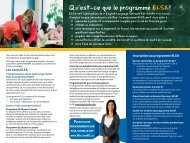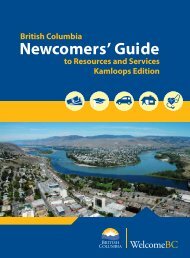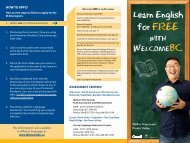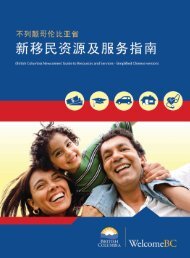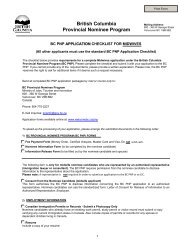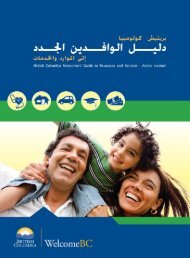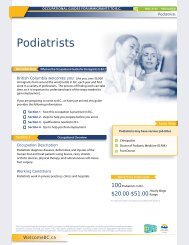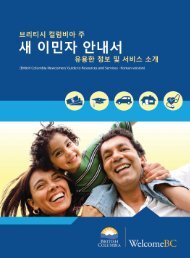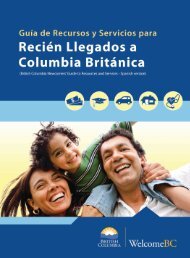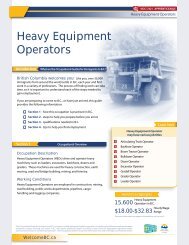Nanaimo - WelcomeBC
Nanaimo - WelcomeBC
Nanaimo - WelcomeBC
Create successful ePaper yourself
Turn your PDF publications into a flip-book with our unique Google optimized e-Paper software.
About British Columbia and <strong>Nanaimo</strong><br />
Many names of places in B.C. are named after<br />
Aboriginal words, for example, <strong>Nanaimo</strong>,<br />
Tsawwassen, Sooke, Esquimalt, Kamloops, and<br />
Chilliwack. The name of the country, Canada,<br />
is Aboriginal in origin. “Canada” is from<br />
the word “kanata” which in Huron-Iroquois<br />
language means “village” or “settlement”.<br />
There are three main groups of Aboriginal<br />
people in Canada: First Nations, Métis and<br />
Inuit. They have many different cultures,<br />
languages, and traditions. Sixty percent of<br />
First Nations languages in Canada are found<br />
in B.C. British Columbia has 32 languages<br />
and 59 dialects.<br />
Métis are people of mixed Aboriginal and<br />
European ancestry. Culture and history<br />
are important parts of being Métis. Their<br />
language is Michif. Inuit people live in<br />
northern Canada. They speak Inuktitut.<br />
Before people came here from Europe,<br />
Aboriginal people had their own societies,<br />
cultures, lands, and laws. In the past, the<br />
federal and provincial governments tried to<br />
change the way of life of Aboriginal people.<br />
For example, children were taken away to<br />
schools, and were not allowed to see their<br />
families or speak their own language.<br />
Now Aboriginal people live in cities, towns and<br />
in their own communities. Aboriginal people<br />
and the governments of B.C. and Canada are<br />
working to make treaties (agreements) to keep<br />
Aboriginal rights and lands, and to improve<br />
education and health in their communities.<br />
The name <strong>Nanaimo</strong> comes from<br />
Snunéymuxw. The Snunéymuxw are a Coast<br />
Salish people who have lived on the eastern<br />
coast of Vancouver Island, the Gulf Islands,<br />
and the Fraser River for thousands of years<br />
before Europeans arrived. The true meaning<br />
of the word is lost, but many elders believe<br />
that it means “a great people”.<br />
Like other Coast Salish peoples, the<br />
Snunéymuxw depended on the ocean for<br />
food and resources. They travelled in spring<br />
and summer to fish. In the fall and winter<br />
they lived in large log longhouses. The<br />
Snunéymuxw First Nation has a population<br />
of over 1,700 people.<br />
Settlers<br />
British and Spanish explorers came to the<br />
Pacific coast in the 1700s. The British explorer<br />
George Vancouver arrived in 1792. Vancouver<br />
Island and the city of Vancouver are named<br />
after him. Other European explorers came to<br />
the Pacific coast by river and on land. One of<br />
these early explorers was Simon Fraser. The<br />
Fraser River is named after him. People found<br />
gold along the Fraser River in 1857. Thousands<br />
of people came to B.C. to look for gold.<br />
In 1867, the provinces of Ontario, Quebec,<br />
New Brunswick, and Nova Scotia joined<br />
together to form Canada. British Columbia<br />
8


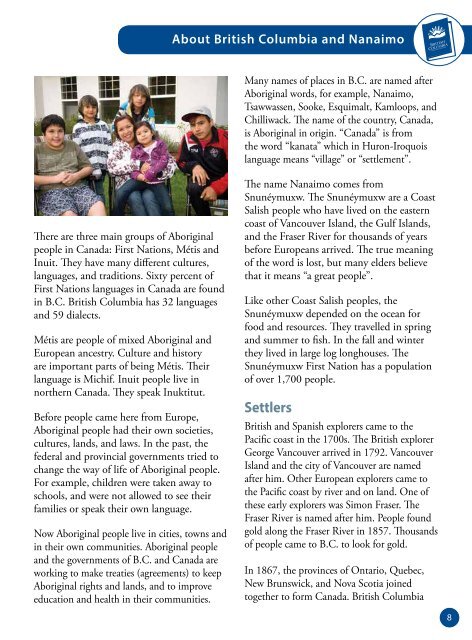
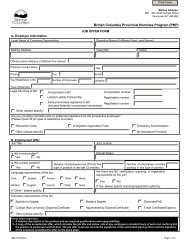
![Medical Radiation Technologists [MRT] - WelcomeBC](https://img.yumpu.com/50071314/1/190x245/medical-radiation-technologists-mrt-welcomebc.jpg?quality=85)
